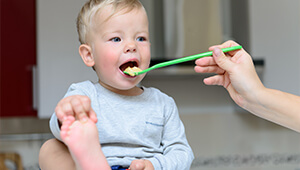Try It. You’ll Like It


Baby food was easy-all that balanced nutrition available in a few jars. Around the time a toddler makes the transition from baby food to table food, however, you may discover that he’s less agreeable about expanding his culinary horizons than he used to be. Why are toddlers sometimes so resistant at feeding time?
“Temperament plays a role-some kids are more willing than others,” says Lynn Brann, R.D., Ph.D., an assistant professor of nutrition at Syracuse University. “But there are things going on developmentally that make this a difficult transition for many toddlers.” She points to the following big three:
First, your child is busy asserting his independence. You’re trying to get him to do something-try a new food-but he’s liable to say no because he’s testing you and seeing what it’s like to exert his own will.
Second, there is so much new in a toddler’s world, they’re naturally leery.
Third, although variety and taste are important components in meals for toddlers, they are more interested in activities other than eating. But don’t give up! There are ways to get your toddler to test her taste buds.
- Offer a new food repeatedly.If something’s rejected two or three times, don’t give up on it, Brann says. Research shows that it takes more than 10 exposures to a food before a toddler is willing to actually consume it. “Even if she agrees to try it after it’s been served just several times, it can be a lot longer before she actually eats it,” she says.
- Let’em play.Your toddler may sniff, smear and do everything but sample a new food. This is how they explore and “get to know” it.
- Vary the packaging.Try foods, such as potatoes, in different forms: mashed, baked, french fries, hash browns and more. Michelle Oddo, a mother in Troy, Mich., swears by boiled, cooled and peeled redskin potatoes with a little butter and a sprinkle of onion powder. “Jenna’s now 4, and she loves garlic, onions and pickles,” she says. “I think it’s because she got used to strong flavors early.”
- Let your child see others eat the food.Toddlers love to imitate. Watching people sample new snacks can make foods more enticing, so get together with friends and offer to share new foods at playdates.
- Don’t pressure, force or make a big deal out of it.Nutritionist Ellyn Satter, R.D., author of Child of Mine: Feeding With Love and Good Sense (Bull Publishing), promotes the “division of responsibility” around eating: The parent is responsible for what, when and where to eat. The toddler is responsible for how much and whether to eat. And, says Brann, “Over the long term, your child will make good choices.”


